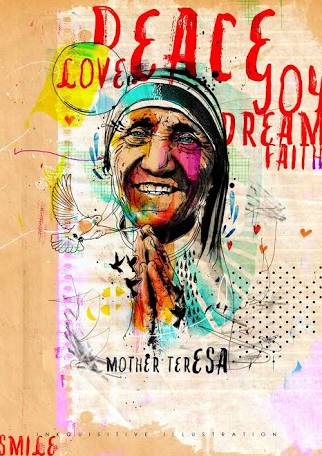Mother Teresa Indian Catholic monk from an Albanian-borne family. (Merciful Mother Teresa)
.jpg) Mother Teresa, known in the Catholic Church as Saint Teresa of Calcutta[6] (born Anjezë Gonxhe Bojaxhiu; Albanian: [aˈɲɛzə ˈɡɔndʒɛ bɔjaˈdʒiu]; 26 August 1910 – 5 September 1997), was an Albanian-Indian[4] Roman Catholic nun and missionary.[7] She was born in Skopje (now the capital of the Republic of Macedonia), then part of the Kosovo Vilayet of the Ottoman Empire. After living in Macedonia for eighteen years she moved to Ireland and then to India, where she lived for most of her life.
Mother Teresa, known in the Catholic Church as Saint Teresa of Calcutta[6] (born Anjezë Gonxhe Bojaxhiu; Albanian: [aˈɲɛzə ˈɡɔndʒɛ bɔjaˈdʒiu]; 26 August 1910 – 5 September 1997), was an Albanian-Indian[4] Roman Catholic nun and missionary.[7] She was born in Skopje (now the capital of the Republic of Macedonia), then part of the Kosovo Vilayet of the Ottoman Empire. After living in Macedonia for eighteen years she moved to Ireland and then to India, where she lived for most of her life.
Mother Teresa
Saint Teresa of Calcutta
MC
MotherTeresa 094.jpg
Mother Teresa at a pro-life meeting
in 1986 in Bonn, West Germany
Consecrated religious, nun
Born Anjezë Gonxhe Bojaxhiu
26 August 1910
Üsküp, Kosovo Vilayet, Ottoman Empire
(present-day Skopje, Republic of Macedonia)
Died 5 September 1997 (aged 87)
Calcutta, West Bengal, India (present-day Kolkata)
Venerated in Roman Catholic Church
Beatified 19 October 2003, Saint Peter's Square, Vatican City by Pope John Paul II
Canonized 4 September 2016, Saint Peter's Square, Vatican City by Pope Francis
Major shrine Mother House of the Missionaries of Charity, Kolkata, West Bengal, India
Feast 5 September[1]
Attributes
Nun's habit
Rosary
Patronage
World Youth Day
Missionaries of Charity
Archdiocese of Calcutta (co-patron) [2][3]
Mother Teresa
Religion Roman Catholicism
Institute Sisters of Loreto
(1928–1948)
Missionaries of Charity
(1950–1997)
Personal
Nationality Ottoman subject (1910–1912)
Serbian subject (1912–1915)
Bulgarian subject (1915–1918)
Yugoslavian subject (1918–1943)
Yugoslavian citizen (1943–1948)
Indian subject (1948–1950)
Indian citizen[4] (1950–1997)
Albanian citizen[5] (1991–1997)
Senior posting
Title Superior general
Period in office 1950–1997
Successor Sr. Nirmala Joshi, MC
Signature Signature of Mother Teresa
In 1950 Teresa founded the Missionaries of Charity, a Roman Catholic religious congregation which had over 4,500 sisters and was active in 133 countries in 2012. The congregation manages homes for people dying of HIV/AIDS, leprosy and tuberculosis; soup kitchens; dispensaries and mobile clinics; children's- and family-counselling programmes; orphanages, and schools. Members, who take vows of chastity, poverty, and obedience, also profess a fourth vow: to give "wholehearted free service to the poorest of the poor".[8].jpg)
Teresa received a number of honours, including the 1962 Ramon Magsaysay Peace Prize and 1979 Nobel Peace Prize. She was canonised (recognised by the church as a saint) on 4 September 2016, and the anniversary of her death (5 September) is her feast day..jpg)
A controversial figure during her life and after her death, Teresa was admired by many for her charitable work. She was praised and criticised for her opposition to abortion, and criticised for poor conditions in her houses for the dying. Her authorised biography was written by Navin Chawla and published in 1992, and she has been the subject of films and other books. On September 6, 2017, Teresa was named co-patron of the Roman Catholic Archdiocese of Calcutta, alongside St. Francis Xavier..jpg)
She was great I don't have words to explain her. I just Salute her.
regards @crafter
You're right